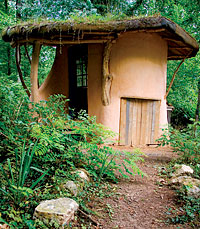Ashevegas today, Ashevillage tomorrow
“What would the Asheville of your wildest dreams look like?” asks Janell Kapoor, co-director of Kleiwerks International, at the start of a community meeting about the Ashevillage Building Convergence.

After everyone has closed their eyes and spent a few moments envisioning Asheville 20 years from now, audience members return to present-day reality and start throwing out popcorn-style descriptions of what they’ve imagined: “Free schools!” “Edible landscaping!” “Cob buildings!” “Housed homeless!” “Renewable energy!”
Kapoor takes the momentum and runs with it, showing the enthusiastic group a slide show of natural-building projects she’s been involved with across the globe—bus shelters made with cob and mosaic tiling; colorful paintings ballooning into street intersections; rooftops with tufts of grass sprouting from them; and happy, muddy people coming together for natural-building projects. Kapoor’s message is clear: This is what we want to do in Asheville.
The collective community vision may start bearing fruit during the Ashevillage Building Convergence, a conference slated for June 20-29, 2008. Kleiwerks, which is organizing the conference, initiates natural-building projects around the world. The nonprofit is patterning its conference after an annual, 10-day event in Portland, Ore., known as the Village Building Convergence.
The Asheville event is billed as a citywide, collaborative gathering that will integrate educational programs, youth activities, neighborhood block parties, a bike/biodiesel tour and hands-on natural-building projects.
“Sustainability … is about finding ways to regenerate our natural and social systems,” says Kapoor. Most of the projects will center on downtown Asheville and West Asheville, she reports, and a stage will showcase local music and community theater.
With nearly a year until liftoff, there’s still plenty of time to get involved, the organizers note, and community members are encouraged to contribute their own visions. To find out more, visit www.ashevillage.org/abc/ or e-mail abc@ashevillage.org.
Community overhauls Shope Creek proposal
Back in April, the U.S. Forest Service proposed logging 68 acres in Shope Creek, a 1,500-acre tract of forestland near Riceville that’s part of Pisgah National Forest (see “Logging Shope’s Slopes,” May 2 Xpress). An open meeting the agency hosted shortly after issuing its proposal attracted a high turnout, including members of the Asheville-based Southern Appalachian Biodiversity Project.
To gauge the community response to the Shope Creek proposal, the nonprofit watchdog group developed an online survey to solicit local feedback. After tallying the local responses, the group formulated an alternative plan for managing Shope Creek and delivered it to the Forest Service July 9.
“We’re confident that this new plan will satisfy the agency’s objectives while meeting the needs of the community and those who value Shope Creek for its recreational opportunities,” says Campaign Coordinator Chris Joyell. “Now we are asking the Forest Service to allow the public to comment on this proposal.”
Rather than going ahead with the logging as proposed, the alternative plan calls for harvesting only non-native white pines. The survey results also reflected community support for maintaining most of the area as old-growth forest, Joyell reports.
District Ranger Anthony Matthews says the agency plans to seriously consider the community-generated alternative. “We’re looking at it and going through it to see if it’s feasible in terms of meeting the objectives of the project,” he says, adding that the Forest Service has scheduled further discussions with the Biodiversity Project.
While it’s common for the public to offer opinions and suggest alternatives to key points of a Forest Service proposal, it’s rare to have a community-based group submit such a thorough, comprehensive plan, notes Matthews. “This one has far more detail. You can tell there was quite a bit of effort put into this,” he says. “It helps us look at other ways of trying to meet certain objectives.”
But while the agency is open to considering the alternative plan, Matthews emphasizes that many details still need to be worked out, and he doesn’t expect a final decision until late September.



Before you comment
The comments section is here to provide a platform for civil dialogue on the issues we face together as a local community. Xpress is committed to offering this platform for all voices, but when the tone of the discussion gets nasty or strays off topic, we believe many people choose not to participate. Xpress editors are determined to moderate comments to ensure a constructive interchange is maintained. All comments judged not to be in keeping with the spirit of civil discourse will be removed and repeat violators will be banned. See here for our terms of service. Thank you for being part of this effort to promote respectful discussion.